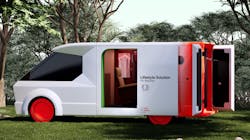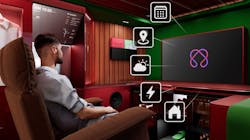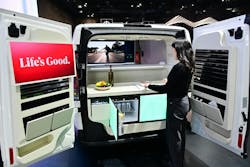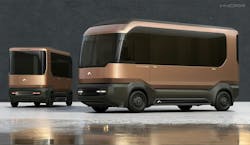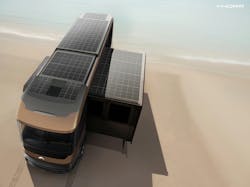AI-Powered RVs and Shape-Shifting Trailers: The Future of Housing?
I’m not much of a camper. I’ve tried a few times, but it’s never gone smoothly. One trip, it rained the whole first day and stormed the second. Thankfully, we weren’t fully in the wild—there was a building with showers, a washer/dryer, and a tiny store. Still, between packing everything (air mattresses, food, towels, rafts, you name it) and dealing with questionable porta-potties, I always end up exhausted and wondering why I didn’t just stay home.
At that same campsite, a few people have year-round RVs—some even with decks and string lights. I’m always jealous. They have shelter, space, and actual comfort.
It’s made me think: what if mobile living didn’t feel like roughing it?
This year at CES, companies like LG and AC Future unveiled mobile smart home concepts that blur the line between vehicle and livable space—with AI, modular rooms, and real amenities. Forget camping. This is a whole new way of thinking about home.
LG's AI Home Solution Takes Mobility to a New Level
At CES 2025, LG Electronics unveiled something that feels like it came straight from the future: a concept vehicle built on its new LG Mobility Experience (MX) platform. The idea? Combine the smarts of a connected home with the flexibility of a vehicle to create an AI-powered mobile living space.
Instead of thinking of RVs as just camping vehicles, LG is reimagining them as personalized smart environments—whether you want a media lounge, a mobile office, or a quiet space to recharge. The interior is modular, so you can shift the layout depending on how you're using it that day. Want to relax? Cook? Work? The space adapts.
The dual-cabin design separates the driver’s area from a rear living zone that can transform into multiple configurations. Inside, LG appliances and AI tech work together to manage things like schedules, lighting, food delivery, even hotel bookings. Their ThinQ ON system acts like a central brain for it all.
And in case owning a high-tech mobile home outright sounds out of reach (because, yeah, same), LG plans to offer it as a subscription service. That could make it more accessible for people who need flexible space, but aren’t ready to drop RV-level money.
They’re also partnering with Kia to push the concept even further. Their Spielraum vehicle combines LG’s AI features with Kia’s PBV (Platform Beyond Vehicle) tech. Two versions were shown:
-
Spielraum Studio: Built for remote work and frequent travel, this model comes with a smart mirror, modular closet (aka LG’s “styler”), and a coffee machine. It even suggests clothing care settings based on your calendar.
-
Spielraum Glow: More of a weekend-warrior vibe—think tailgating, car picnics, or camping without suffering. It includes a fridge, Lightwave oven, and wine cellar. MoodUP panels let you change the lighting and colors to match your mood.
While this version isn't fully a "living" space, it does offer a lot of convenience, even for camping.
AC Future's AI-Transformer Home: A Mobile Smart House With a Twist
AC Future took a different angle, but with the same core idea: rethink how people live, especially as home ownership gets tougher and sustainability becomes non-negotiable.
Their concept, the Ai-TH, expands (literally) into a 400-square-foot smart home with zero-emissions off-grid capabilities. Think solar charging, water generation, and built-in internet connectivity. At the press of a button, the trailer unfolds to reveal not just a living area, but a 40-square-foot patio too.
This isn’t just a cool tech demo. It’s meant to address the global housing crisis by creating mobile, modular, and efficient living spaces that feel like real homes and not scaled-down compromises.
They showcased three versions:
- Ai-THu: A 24-foot trailer that expands into a full smart home. No driver’s cabin means more room to live. Great for stationary use.
- Ai-THt: Designed for towing, this version keeps the off-grid perks while offering flexibility on the move.
- Ai-THd: A drivable version that converts from a vehicle into a smart home. It’s a bit shorter (26 feet, expanding to 33), but the cockpit can double as a bedroom or office—so no space is wasted.
Each design comes with the core off-grid perks: solar panels, energy storage, a water generator, and high-end appliances. And the vibe? Definitely more architectural elegance than your average trailer.
Between LG’s AI-powered cabin-on-wheels and AC Future’s expandable transformer homes, we’re seeing a shift in how people think about space—especially space that moves with you.
It’s not just about mobility anymore. It’s about comfort, customization, and autonomy. Whether you're road-tripping, working remotely, downsizing, or just rethinking what “home” means, these concepts hint at what’s coming next.
And maybe, just maybe, one day I’ll roll up to that campsite in a sleek, solar-powered smart home—with a real bathroom, clean bedding, and zero skunks to worry about.
Fun Innovations Friday
Created by the editors of New Equipment Digest and Plant Services, Fun Innovations Friday is a feel-good blog that showcases how advances in science, math, engineering, and technology are making our world more whimsical. Here’s another post that is guaranteed to brighten your day.
This Week in Robots: Cheap Androids, Firefighting Dogs, and Clever Knitting Machines
These bots don’t just walk and talk—they spray flames, assemble puzzles, and stitch with style.
About the Author
Laura Davis
Editor-in-Chief, New Equipment Digest
Laura Davis is the editor in chief of New Equipment Digest (NED), a brand part of the Manufacturing Group at EndeavorB2B. NED covers all products, equipment, solutions, and technology related to the broad scope of manufacturing, from mops and buckets to robots and automation. Laura has been a manufacturing product writer for eight years, knowledgeable about the ins and outs of the industry, along with what readers are looking for when wanting to learn about the latest products on the market.
